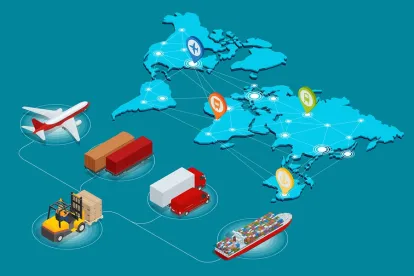A potential area of increased transatlantic collaboration could center on ongoing efforts to reform the World Trade Organization (WTO). China’s response to the COVID-19 pandemic may provide an avenue for the United States (US) and European Union (EU), along with the United Kingdom (UK) and other like-minded trading partners, to bridge divides on WTO reform priorities. Meanwhile, the search for a new WTO Director-General and the effects of the pandemic on domestic economies have essentially stalled reform efforts. Transatlantic partners are also seeing some synergy on facial recognition software and data privacy concerns, as well as addressing disinformation campaigns from foreign governments. There have also been some developments in EU-UK Brexit talks, as well as in the US-UK and US-EU relationships.
WTO Reform | Potential for Increased Transatlantic Collaboration
On 11 February, the Office of the US Trade Representative (USTR) released a 174-page report on the WTO Appellate Body. In its’ first-ever comprehensive study of the WTO Appellate Body’s record, USTR provided an in-depth assessment of the Appellate Body’s perceived failures to comply with WTO rules and interpret WTO agreements as written. In an accompanying statement, US Trade Representative Robert Lighthizer reiterated the US position regarding the Appellate Body:
For more than 20 years, successive Administrations and the U.S. Congress have voiced significant concerns that the Appellate Body has failed to function according to the rules agreed by the United States and other WTO Members. Unfortunately, the conduct of the Appellate Body has converted the WTO from a forum for discussion and negotiation into a forum for litigation. President [Donald] Trump is committed to a trade agenda that benefits all Americans, and a reassessment of the WTO and its role is a key part of that agenda.”
Amid stalled WTO reform talks, the WTO is moving forward with electing a new Director-General, after Roberto Azevêdo announced in mid-May he would step down on 31 August. EU Trade Commissioner Phil Hogan confirmed on 9 June that he is considering the “option of being a candidate for the director general of the WTO,” following a meeting with EU Ministers. In his statement, Hogan discussed “the important amount of work to be done to reform the organization, to make it more effective and efficient, but also to deal with many of the important trade issues that are bedeviling the international community now arising from COVID 19.”
Hogan also emphasized the need for the EU to put forward a single candidate to represent team Europe. According to Hogan the “EU is in a legitimate position to offer a director general to the WTO.” Hogan also confirmed that he had discussed his potential candidacy with Ambassador Lighthizer, stating, “Lighthizer is very much of the view that a developed country should assume the responsibility of the director general of the WTO.” However, Lighthizer has not officially thrown his support behind any candidate with a USTR spokesperson saying, “Ambassador Lighthizer does not support any candidate at this time, nor does he feel that a candidate must necessarily be from a developed country.” Overall, this will be a difficult diplomatic exercise and remains a contentious issue for both the US and the EU, as both sides have differing priorities. The EU generally seeks breaking down protectionist trade barriers, while the US is concerned that WTO rulings infringe on state sovereignty and calls for significant rules changes, including revising the definition of “developing country.”
French Trade Secretary Jean-Baptiste Lemoyne has suggested that France would be keeping its options open, telling reporters that it was important for the EU to support jointly a candidate with a “pro-active WTO reform agenda.” Dutch Trade Minister Sigrid Kaag also told reporters that the EU should consider backing candidates from outside the bloc stating, “We don’t necessarily want to search outside the EU, but we shouldn’t close that door yet either.” So far, member states have officially announced three candidates for the Director-General (DG) position. This includes: Jesús Seade Kuri of Mexico; Dr. Ngozi Okonjo-Iweala of Nigeria; and Abdel-Hamid Mamdouh of Egypt. Should a DG not be selected before Azevêdo’s departure, the WTO’s General Council will designate one of four Deputy DGs to serve as Acting DG until the selection process is completed. Meanwhile, the June 2020 Ministerial Conference has been postponed to either summer or winter of 2021, due to the COVID-19 pandemic.
The United States continues to block the Appellate Body appointments, which effectively halted the dispute settlement mechanism in December 2019, as it continues to push for substantive reform. China’s practices remain one of the biggest motivators behind US WTO reform efforts. On 5 March, the United States argued the remaining WTO Appellate Body adjudicator, Hong Zhao, is ineligible to continue serving, citing she is affiliated with the Chinese government and therefore not impartial. US Ambassador to the WTO Denis Shea noted Zhao is the vice president of the Academy of International Trade and Economic Cooperation, which he claimed is under the auspices of the Ministry of Commerce. Ambassador Shea reminded Article 17.3 of the Dispute Settlement Understanding states that Appellate Body members “shall be unaffiliated with any government.” Zhao’s term expires in November.
On 3 March, at the WTO’s General Council meeting, the EU, China and India expressed frustration over the lack of proposals from the United States to resolve the US block on Appellate Body appointments. WTO members cited USTR’s report in February that reiterated US arguments for WTO Appellate Body reform but pointed out the United States has yet to table proposed solutions. The United States reiterated its arguments against special and differential treatment for self-proclaimed developing countries. At the end of February, Ambassador Lighthizer reportedly indicated support for a draft Executive Order under consideration in the White House, led by White House Economic Advisor Peter Navarro, that would see the United States exit the WTO Government Procurement Agreement, if the WTO is not significantly reformed. President Trump has not signed the rumored order.
Nevertheless, WTO reform, centered on concerns related to China, remains an area where the United States and EU, along with other partners, such as Japan, could continue collaborations. In mid-January, the trilateral partners issued a joint statement on their continued work to address concerns related to industrial subsidies and state-owned enterprises, forced technology transfers, increasing compliance with required WTO notification obligations, and industrial excess capacity, among other matters. Increasing criticisms in light of China’s response to the COVID-19 pandemic could increase WTO member state support for WTO reform efforts. Not surprisingly, however, WTO reform efforts have been quiet as nations focused on responding to the pandemic and corresponding challenges to their domestic economies.
Facial Recognition Technology & Data Privacy Concerns; Countering Disinformation Campaigns
The European Data Protection Board has stated that it “doubts” using facial recognition technology developed by US company Clearview AI is legal in the EU. Clearview AI allows users to link facial images of an individual to a database of circa 3 billion pictures pulled from sources including social media. Reports indicate that over 600 law enforcement agencies have made use of the app. An inquiry was made earlier in the year by the Swedish data regulator, which revealed that police officers used the app and in March Hamburg’s regulator launched a preliminary investigation into the company.
In an attempt to prevent tech sovereignty, Germany and France have launched Gaia-X an alternative platform to companies including Amazon Web Services and Alibaba. Gaia-X was unveiled in Germany last October by a Belgian non-profit and seeks to ensure member companies abide by its goals of data sovereignty, availability, interoperability, portability, transparency and fair participation. The platform would furthermore address potential conflicts between EU privacy laws and the US Clarifying Lawful Overseas Use of Data Act, or “Cloud Act”. Microsoft has expressed support for the app, which French Minister of Economy and Finance Bruno Le Maire has said would require members to inform clients if data becomes subject to laws like the Cloud Act.
In response to the Black Lives Matter protests, and concerns that artificial intelligence technology may be racially biased, Amazon and IBM announced they would limit the use of their facial recognition software by law enforcement entities. Regarding a one-year moratorium on US domestic police forces from using its Rekognition software, Amazon said in a statement, “We’ve advocated that governments should put in place stronger regulations to govern the ethical use of facial recognition technology, and in recent days, Congress appears ready to take on this challenge.” Organizations using the technology to deter human trafficking can still do so. IBM Chief Executive Arvind Krishna reportedly sent a letter to Congress stating, “[N]ow is the time to begin a national dialogue on whether and how facial recognition technology should be employed by domestic law enforcement agencies.” Microsoft also confirmed this week that it has not sold its facial recognition technology to domestic police departments, confirming it awaits a federal law regulating this technology. On Friday, President Trump retweeted former US Ambassador to Germany Richard Grenell’s tweet that suggested Microsoft should “be barred from federal government contracts – there should be consequences for not selling technology to police departments.”
Last week, the Senate Intelligence Committee approved a provision that would require the Director of National Intelligence (DNI) to submit a report to Congress on the threats posed by foreign government and other entity use of commercially available surveillance software. DNI’s report would be sent to Congress 180 days after the Intelligence Authorization Act for 2021 (S. 3905) is enacted. It is to contain information on how the US and partners can work to reduce the threats of commercial spyware, including through diplomatic pressure, export controls, and trade agreements, as well as work with the technology and telecommunications sectors to secure consumers’ software. The bill also would require the US intelligence community to gain a better understanding of the cybersecurity threats posed by foreign adversaries’ telecommunications companies and Chinese disinformation and cyber-operations, among other things. The text of the bill was released publicly on Thursday.
Whereas the EU has the General Data Protection Regulation (GDPR) in place to protect EU citizens’ data privacy, in the United States, the Federal Government has yet to enact a federal digital privacy law, leaving a patchwork of states to consider options on this matter. In June 2018, the US state of California passed its own law, the California Consumer Privacy Act (CCPA). The law went into effect on 1 January 2020. Some believe the CCPA is the national standard for protecting consumer’s data online in the United States. In sum, the CCPA allows Californians to find out what personal information a business may be collecting about them online from their devices[1], and opt-out of the sale of this information. On 2 June, California Attorney General Xavier Becerra (Democrat) released the state’s final set of rules to guide businesses in how they should notify Californians of their rights under the CCPA. The state of California plans to start enforcing the law on 1 July.
For further details on the CCPA, please see our analysis on this topic here. We also have a thought piece exploring the long-debated topic of privacy vs. security, especially amid a digital age and the pandemic, available here.
On June 9, the EU announced plans to tackle online falsehoods connected to the COVID-19 pandemic. In its plans, the Commission mentions Beijing as a source of online disinformation linked to the virus aimed at undermining Western democracies and at projecting a distorted view of the Chinese response to the pandemic. Russia has also been blamed for using similar tactics. Consequently, social media companies have been called upon to deliver reports on a monthly basis as to how they were tackling the disinformation surrounding COVID-19.
Republican US lawmakers are also seeking ways to counter disinformation campaigns predominately seen as originating from Russia, China and Iran. On 10 June, the Republican Study Committee (RSC), the largest caucus of conservatives in the US House of Representatives, released a document titled, “The RSC National Security Strategy: Strengthening America & Countering Global Threats.” The RSC proposes over 130 solutions for countering China, Russia, Iran and others, including blocking Chinese propaganda efforts, designating Russia as a State Sponsor of Terrorism, countering China and Russia’s efforts to control international bodies, and reconstituting the US Information Agency (USIA) and empowering it with US public diplomacy and counter disinformation efforts, among other things. Expect to see themes outlined in the document touted during the election cycle, as well as related provisions offered to must-pass legislation, such as the Fiscal Year (FY) 2021 National Defense Authorization Act (NDAA). The Senate Armed Services Committee concluded its largely closed-door mark-up of its NDAA measure this week. The House Armed Services Committee is scheduled to follow suit later this month.
EU-UK Trade Talks
The EU has proposed weekly Brexit talks in order to find “compromises”, insisting the UK will not be able to cherry-pick items or backtrack on any promises already made. On Wednesday, the UK House of Commons’ Brexit Committee was warned by a number of experts, including trade consultant Anna Jerzewska, that the UK is not ready for what will happen when the transition period ends and adequate border preparations have not been made. At the same Committee meeting, the House was also asked to consider extending the transition period to allow more time for a trade deal to be reached with the EU, as well as ratified and implemented.
The lack of progress and potential trade disruptions are increasingly worrying businesses. The Confederation of British Industry urged the UK Government to intervene and prevent a “deeply damaging no deal.” Just six months before post-Brexit customs rules are due to be implemented, there are still no plans on how cargo traffic at the Dover-Calais (France) route will operate.
Last week, the Bank of England told top UK lenders to increase their preparations for a no-deal withdrawal, a warning that came ahead of the latest scheduled negotiations between the EU and the UK, which ended in deadlock on Friday. To date, the EU has rejected demands from the UK that financial companies should be allowed to benefit from greater market access than firms in other countries the EU has trade deals with, including Japan. So-called equivalence findings, which would be essential for capital flows to be maintained after Brexit, are expected to be agreed upon by the end of this month.
On Monday, 15 June, both sides will take stock of progress, with UK Prime Minister Boris Johnson expected to meet European Commission President Ursula von der Leyen and European Council President Charles Michel by video conference in order to move the process along. It is considered important, if not essential by the UK, that July negotiations are moved along more intensively, with more face-to-face meetings. The EU is hoping that negotiations can concluded by the European Council Summit, set for 15-16 October, in order to provide sufficient time to ratify agreements.
US-UK Developments
In a leaked memo, the UK Government has instructed Ministers to negotiate with “no specific policy” on animal welfare in US trade talks. The memo indicates that the negotiating mandate “is being updated to reflect” this matter and that the purpose of talks is to “maximize leverage” in trade negotiations with the EU. Joined by former UK Environment Secretary Theresa Villiers, animal welfare groups have been warning that a US trade deal promising tariffs on chlorinated chicken does not go far enough. Meanwhile, the House of Lords’ International Agreements Subcommittee launched its first call for evidence on 8 June with respect to the ongoing UK-US trade negotiations.
On Tuesday, 9 June, US Secretary of State Mike Pompeo issued a statement of solidarity for its allies and partners “against the Chinese Communist Party’s coercive bullying tactics.” In particular, he spotlighted: “Beijing has reportedly threatened to punish British bank HSBC and to break commitments to build nuclear power plants in the United Kingdom [U.K.] unless London allows Huawei to build its 5G network.” Secretary Pompeo pointedly reminded, “Beijing’s aggressive behavior shows why countries should avoid economic overreliance on China and should guard their critical infrastructure from CCP influence.” The Secretary affirmed, “The United States stands ready to assist our friends in the U.K. with any needs they have, from building secure and reliable nuclear power plants to developing trusted 5G solutions that protect their citizens’ privacy.”
US-EU Developments
With the US election season fast upon America, EU Chief Trade Negotiator Paul Hogan provided an update on the state of EU-US negotiations to EU Trade Ministers on Tuesday, 9 June. He suggested the US elections have distracted the Trump Administration. Hogan added talks have not progressed on a possible trade agreement or toward finding a compromise for resolving the long-standing large commercial aircraft dispute.
In an interview, former US Ambassador to the EU Anthony Gardner described the blockbuster free-trade agreement era to be at an end. He acknowledged that during his time as Ambassador under former US President Barack Obama, transatlantic negotiators had likely failed at their last chance for a comprehensive US-EU trade deal, adding both parties also lost years of essential cooperation on issues including climate change and WTO reform. Gardner further predicted the UK would look to leave the EU without a deal and may struggle to reach a trade agreement deal with Washington.
Meanwhile, last week in interactions with the media, President Trump again threatened to impose tariffs on auto imports from the EU, unless the bloc agrees to drop its tariffs on US lobsters. In November, the EU rejected a proposal from the United States for a mini trade deal that would have included lobsters and chemicals.
Wolfgang Maschek provided insights for this report.
________________
[1] This includes information such as online purchases; location data; photos taken; and e-mails, even those that have been deleted.









 />i
/>i

